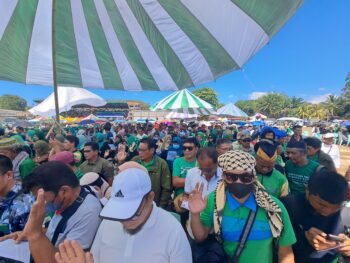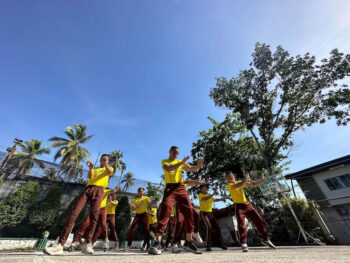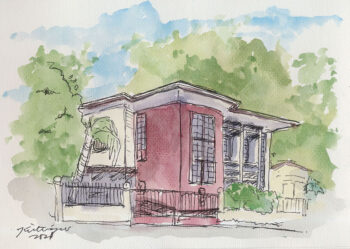MAKATI CITY (MindaNews /19 January) – At the sideline of a peace-building symposium-workshop at the height of the national electoral campaign period last year, the casual conversation between two long-time friends, a Muslim NGO worker and a Mindanao-based non-Muslim journalist, turned into a heated argument over an ‘accurate’ descriptive word for such groups as the Abu Sayyaf Group and others.
The NGO worker protested against the journalist’s use of the term ‘Islamic extremism’ to describe such groups or their activities. “They cannot be ‘Islamic’ because what they are doing are clearly against the teachings of Islam!” he would complain.
“But they are using Islamic symbols, metaphors and justifications!” the journalist would reason out.
As I was attentively listening to both arguments, I can’t help but call to mind postmodernism’s recurring themes, particularly Jacques Derrida’s ‘grammatology’ or semiotic analysis given in his various writings.
Derrida’s grammatology
According to Derrida, who was a preeminent postmodernist figure, textual is the way in which the social world is constructed. For him the world is constituted like a text such that interpreting the world reflects what he calls “the textual interplay at work,” or the concepts and structures of language.
In order to expose these textual interplays, Derrida advances two ways, viz. deconstruction and double reading (Derrida, Of Grammatology, 1976). Anchored in the idea that seemingly stable and natural concepts and relations within language are in fact artificial constructs, arranged hierarchically such that in the case of opposites in language one term is always privileged over the other, deconstruction is a means of showing how all theories and discourses rely on artificial stabilities produced by the use of seemingly objective and natural oppositions in language; for example, light/darkness, knowledge/ignorance, white/black, friend/enemy.
In a bid to demonstrate how these stabilizations operate, Derrida subjects the text to double reading, the first being a repetition of the dominant reading to show how it achieves its outward coherence and the second being the demonstration of the internal tensions within a text that result from the use of ostensibly natural stabilizations. His aim is not to come to a ‘correct’ or even ‘one’ reading of a text, but to show how there is always more than one reading of any text.
Applying both deconstruction and double reading, one would venture to ask, “If used to modify something praiseworthy, which term is privileged over the other – ‘Islamic’ or ‘un-Islamic’? How about if it is used to describe something blameworthy?” “In between ‘Islamic’ and ‘un-Islamic’ at both ends of a spectrum, is there any possibility of a third modifier? In other words, is there a possible gray in between white and black?”
Islamic?
The argument goes, “They are ‘Islamic’ groups in the sense that their members are Muslims, or at least, they claim to be such; they use Islamic symbols and metaphors such as the black flag with religious inscription in Arabic, and the utterance of ‘Allahu akbar’ (‘Allah is the greatest’) in their propaganda materials; they justify their acts as part of ‘jihad’.”
Backed up by this kind of reasoning, the label ‘Islamic’ inevitably gives the impression that the term being described is ideally representative of, or in line with, Islam and that there is a unanimous view of Muslims or the majority of them in this regard. But the truth of the matter is that it is not so. In fact, many Muslims, if not most of them, take offense with the media hype ‘Islamic terrorism’ or ‘Islamic extremism’.
As an expected drawback, such a label provides such groups an axe to grind about the allegation that “there is indeed a foreign (Western) conspiracy to demonize Islam and the Muslims,” thereby aptly dragging the ‘victimized’ typical Muslims into the warm embrace of those groups.
‘Maute Group’
The appellation ‘Maute Group’ also works the same way. What is the origin of the appellation? Do the leadership and members of the group explicitly identify themselves as such?
A background study of the group shows that since 2013 it has been identifying itself as ‘Dawlah Islamiyah’ (‘Islamic State’) [in Lanao] while its precursor was Khilafah Islamiyah Mindanao-Black Flag Movement (KIM-BFM).
Then, who originates the ‘Maute Group’ appellation? If Google search were the basis, the media that oftentimes erroneously describes ‘Khilafah Islamiyah Mindanao’ as ‘Khalifah’ (Caliph) (instead of ‘Khilafah’ (Caliphate)) is also the one that cogently coins the appellation, obviously for convenience’s sake.
What’s the justification? “Well, the founders of the group are two Maute brothers, Abdullah and Omar, and a good number of its members are the founders’ relatives,” one might be put forth.
Granted that tens, say fifty, members of the group bear the family name ‘Maute’, is this hasty generalization justifiable? Is it reasonable to implicitly implicate in the popular court of public opinion the hundreds, if not thousands, of members of the clan to the group and its notoriety?
Is this not playing the very game of the players one refuses to play with?
No wonder, for individuals for whom drowning in the deep blue sea of stereotyping and guilt by association is imminent, befriending the ‘devil’ of violent extremism is by far ‘a lesser evil’.
Un-Islamic?
The binary opposite of this ‘Islamic’ appellation is the simplistic dismissal and dissociation of such groups with Islam:
“The ISIS is un-Islamic. The activities of such-and-such groups are against the teachings and principles of Islam. Those who commit such acts are not Muslims, even if they call themselves ‘Muslims’. Terrorism is ‘haram’. No Muslim is a terrorist!”
The fact is that with all their doctrinal sophistication and communication astuteness, these groups use Islamic symbols and theological bases in such a way that awfully appeal to the innate idealism and heroism of young Muslims.
As you condemn terrorism, they would instantly present you with a plethora of Qur’anic passages, citations from the Prophetic tradition (hadith), and/or selective historical accounts in order to doctrinally justify their violent acts. Worse still, they might even declare that it is you who actually went outside the pale of Islam and is condemned to death for being a ‘murtad’ (apostate)!
No doubt, a regional Muslim authority’s issuance of a religious edict (fatwa) against terrorism in 2015 can be considered a laudable bold step. Yet, the fact that the said fatwa is written in Arabic and that no official English and Filipino translations of it have been so far posted in the same website two years since its issuance is something regrettable, as it dismally fails to reach a wider audience – the overwhelming majority of local Muslims, the youth in particular, who are not Arabic literate.
In this age of information overload and unprecedented speed wherein religious sermons delivered on top of the wooden ‘mimbar’ (pulpit) of the mosque are replaced (or supplemented) by Facebook posts and Tweets in the cyberspace, the ‘khatib’ (preacher) needs more than a loud speaker.
The middle ground
After doing Derridian ‘deconstruction’ and ‘double reading’ of the terms ‘Islamic’ and ‘un-Islamic’ to describe certain groups, is ‘a third reading’ possible? Can we come up with a middle ground? Can we find a neutral platform?
As I was passively listening to the arguments of the journalist (who uses the appellation ‘Islamic’ to those groups) and the NGO worker (who, in contrast, prefers the label ‘un-Islamic’ to describe the same), I was imagining myself telling them both, “In my personal opinion, both of you have valid points in your arguments. Apart from ‘Islamic’ and ‘un-Islamic’, ‘Islamist’ is a due candidate to describe those groups – more accurately. The modifier ‘Islamist’ suggests that those groups adopt Islam – implicitly or explicitly – as their overarching ideology (‘ism’) but whether this adoption is religiously correct or not on the basis of the textual sources of Islam is a different story.”
In other words, the universe is not a monopoly of binary equations. The world is not always a case of “Either you are with us, or you are with the terrorists.” Zero-sum is not always the game in town.
In the Derridian jargon, there is always a multiple reading of a text.
[MindaViews is the opinion section of MindaNews. Mansoor L. Limba, PhD in International Relations, is a writer, educator, blogger, chess trainer, and translator (from Persian into English and Filipino) with tens of written and translation works to his credit on such subjects as international politics, history, political philosophy, intra-faith and interfaith relations, cultural heritage, Islamic finance, jurisprudence (fiqh), theology (‘ilm al-kalam), Qur’anic sciences and exegesis (tafsir), hadith, ethics, and mysticism. He can be reached at mlimba@diplomats.com, or http://www.mlimba.com and http://www.muslimandmoney.com.]







